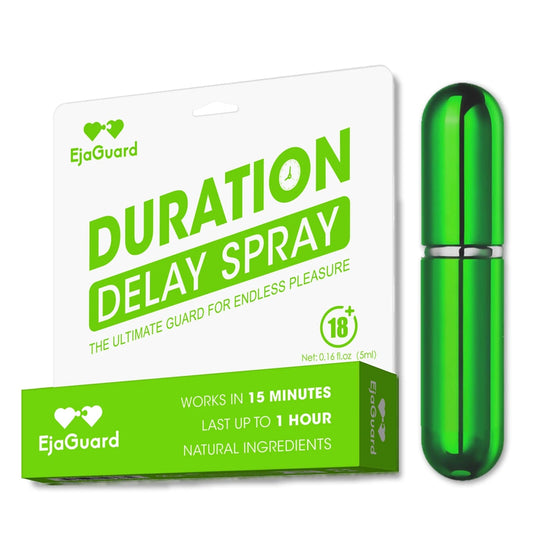Der ultimative Leitfaden zur Überwindung der Masturbation: 7 Tipps zum Umgang mit zwanghaftem Verhalten
Wenn Ihre Masturbationsgewohnheiten außer Kontrolle geraten, sollten diese Tipps helfen!
Masturbation ist ein natürlicher und gesunder Aspekt der menschlichen Sexualität.
Obwohl Masturbation ihre Vorteile hat, kann sie auch negative Auswirkungen haben, wenn sie Ihre täglichen Aktivitäten stört.
In diesem Artikel untersuchen wir Methoden, die Ihnen dabei helfen, Ihre Masturbationsgewohnheiten in den Griff zu bekommen und den Kreislauf zwanghaften Sexualverhaltens zu durchbrechen.
Haben Sie ein Problem mit Masturbation?
Masturbation ist ein ganz normaler Teil unserer sexuellen Gesundheit. Als lustvolle Möglichkeit, Spannungen abzubauen, Selbstbefriedigung zu erleben und unsere Sexualität zu erkunden, ist Masturbation ein weit verbreitetes Sexualverhalten, das sowohl Männer als auch Frauen von Zeit zu Zeit genießen.
Es können jedoch Probleme auftreten, wenn Ihre Masturbationsgewohnheiten Ihren Alltag dominieren. In diesem Fall haben Sie es möglicherweise mit zwanghafter Masturbation zu tun, einer sexuellen Sucht, die sich negativ auf Ihre geistige Gesundheit auswirken kann.
Zwanghafte Masturbation tritt auf, wenn Sie:
- Haben Sie einen unkontrollierbaren Drang zu masturbieren
- Lassen Sie Ihre täglichen Aktivitäten, geplanten Veranstaltungen, die Arbeit oder die Schule ausfallen, um zu masturbieren
- Planen Sie Ihren Tag so, dass Sie Zeit haben, alleine zu masturbieren
- Nutzen Sie Masturbation als Mittel zur Regulierung Ihrer Stimmung (z. B. wenn Sie traurig, frustriert oder wütend sind).
Häufige Nebenwirkungen übermäßiger Masturbation
Übermäßige Masturbation, auch als zwanghafte oder chronische Masturbation bekannt, kann zu einer Reihe von Nebenwirkungen führen – von körperlichem Unbehagen bis hin zu sozialem Stress und möglichen psychischen Problemen.
Obwohl zwanghaftes Sexualverhalten von Person zu Person unterschiedlich erlebt wird, sind mit diesem Problem häufig bestimmte Nebenwirkungen verbunden.
Dazu gehören:
- Hautreizung
- Schwellung im Genitalbereich
- Soziale Isolation
- Geringeres Selbstwertgefühl
- Stress, Angstzustände, Depressionen oder andere psychische Erkrankungen
- Unfähigkeit, eine romantische Beziehung zu einem Sexualpartner aufzubauen
- Nichterfüllung notwendiger täglicher Aufgaben
- Desinteresse oder Loslösung von Aktivitäten, die früher Spaß gemacht haben
- Scham- oder Schuldgefühle gegenüber sexuellem Verhalten
- Mögliche Entwicklung einer Masturbationssucht
Mit dem Masturbieren aufhören
Wenn Ihre Masturbationsgewohnheiten außer Kontrolle geraten, sind wir hier, um Ihnen zu helfen.
Hier sind 7 wirksame Tipps zum Umgang mit zwanghaftem Sexualverhalten, die Ihnen dabei helfen, mit dem Masturbieren aufzuhören.
1. Hören Sie auf, Pornografie anzuschauen
Der erste Schritt zur Heilung der zwanghaften Masturbation besteht darin, mit dem Anschauen von Pornografie aufzuhören.
Oft dient Pornografie als natürlicher Auslöser, der uns zur Masturbation anregt, selbst wenn wir nicht in der Stimmung oder Verfassung für sexuelle Aktivitäten sind.
Die Sexualexpertin und klinische Psychologin Dr. Nazanin Moali weist darauf hin, dass Pornografie visuelle Reize verwendet, die den „Belohnungspfad“ unseres Gehirns aktivieren. Im Vergleich zu unseren sexuellen Fantasien fördert diese unmittelbare Stimulation ein gesteigertes Bedürfnis nach sexueller Lust.
Wenn Sie Angst haben, der Versuchung zu erliegen, können Sie eine Porno-Blocker-Software verwenden, um alle expliziten Bilder oder Links mit pornografischem Inhalt auf Ihrem Telefon oder Computer einzuschränken und zu filtern.
2. Füllen Sie die Lücke
Wenn wir uns dazu entschließen, eine Gewohnheit aufzugeben, ist es wichtig, an ihrer Stelle neue Gewohnheiten zu etablieren.
Indem wir die Leere mit positiven, produktiven Aktivitäten füllen, können wir unsere Energie von alten Mustern weg lenken.
Ein äußerst nützlicher Ersatz für die Masturbation ist körperliche Betätigung!
Regelmäßige Bewegung wirkt sich sowohl auf die körperliche als auch auf die geistige Gesundheit aus. Wie Masturbation löst Bewegung die Ausschüttung von Endorphinen aus, die die Stimmung heben und die Entspannung fördern.
Wenn Sie das nächste Mal ein starkes sexuelles Verlangen verspüren und masturbieren möchten, sollten Sie einen Spaziergang an der frischen Luft machen, im Fitnessstudio Gewichtheben machen oder mit Freunden gemeinsam Sport treiben.
3. Bleiben Sie in Ihren persönlichen Beziehungen präsent
Obwohl Masturbation ein natürlicher Aspekt unserer sexuellen Gesundheit und unseres Wohlbefindens ist, wird sie problematisch, wenn sie dazu führt, dass Verabredungen mit Freunden abgesagt, Veranstaltungen verschoben oder sogar sexuelle Aktivitäten gänzlich vermieden werden.
Die klinische Psychologin und Sexualexpertin Dr. Jenny Taitz betont, wie wichtig es ist, die mit der Masturbation verbundenen negativen Muster zu erkennen, etwa das Vermeiden körperlicher Intimität oder emotionaler Bindungen zu anderen.
Um zwanghafte Masturbation zu bekämpfen, ist es wichtig, Beziehungen zu Freunden, Familie und romantischen Partnern Priorität einzuräumen. Indem wir mehr Energie in gesündere Beziehungen zu anderen investieren, verringern wir die Wahrscheinlichkeit, dass wir uns der Masturbation als Bewältigungsmechanismus für Langeweile, Stress oder Einsamkeit zuwenden.
4. Machen Sie einen kleinen Schritt nach dem anderen
Das Aufgeben von Gewohnheiten oder das Vornehmen von Änderungen lohnt sich oft, wenn man mit kleinen Schritten beginnt.
Jede kleine positive Veränderung, die Sie umsetzen, kann Ihr Selbstvertrauen stärken und Ihre Motivation aufrechterhalten und Sie bei Ihren Bemühungen unterstützen, auf das Masturbieren zu verzichten.
Nehmen Sie sich beispielsweise nicht vor, sofort ganz mit dem Masturbieren aufzuhören, sondern verschieben Sie es zunächst auf eine bestimmte Zeit später am Tag. Verlängern Sie dann nach und nach die Zeit ohne Masturbieren, indem Sie sich jeweils einen Tag vornehmen, bis Sie eine ganze Woche durchhalten.
Mit jedem erreichten Meilenstein etablieren Sie wertvolle neue Gewohnheiten, die Ihr ultimatives Ziel, die zwanghafte Masturbation zu überwinden, unterstützen.
5. Begrenzen Sie die Zeit, die Sie allein verbringen
Um sich weiterhin auf die Beendigung der Masturbation konzentrieren zu können, ist es wichtig, die Zeit, die man allein verbringt, zu reduzieren.
Da Masturbation typischerweise in der Privatsphäre unseres Zuhauses stattfindet, kann übermäßige Zeit allein die Gelegenheit zu diesem Verhalten erhöhen.
Informieren Sie Ihre Freunde über Ihren Wunsch, nach der Arbeit Zeit miteinander zu verbringen, Familienmitglieder zu besuchen oder neuen Hobbys nachzugehen – alles, was Ihren Geist von zwanghaften Gedanken oder Verhaltensweisen im Zusammenhang mit Masturbation ablenkt.
6. Seien Sie nett zu sich selbst
Wenn wir versuchen, eine Gewohnheit aufzugeben oder ein Verhalten zu ändern, das uns außer Kontrolle geraten scheint, ist es bei Rückschlägen üblich, dass wir Schuldgefühle, Frustration oder Scham verspüren. Wenn wir uns jedoch mit diesen vermeintlichen „Misserfolgen“ beschäftigen, wird dieser Teufelskreis oft noch verstärkt und es wird schwieriger, sich davon zu befreien.
Das Üben von Selbstmitgefühl ist entscheidend für unser geistiges Wohlbefinden und für die Schaffung dauerhafter positiver Veränderungen. Erkennen Sie, dass der Fortschritt nicht immer geradlinig ist, und erlauben Sie sich, auch nach Rückschlägen weiter voranzuschreiten.
7. Seien Sie bereit, um Hilfe zu bitten
Wenn wir merken, dass wir darum kämpfen, die Kontrolle über unsere Gedanken oder unser Verhalten zurückzuerlangen, kann es entmutigend sein, uns selbst für Veränderungen verantwortlich zu machen.
Die Bereitschaft, bei Bedarf Hilfe in Anspruch zu nehmen, ist ein positiver Schritt zur Überwindung außer Kontrolle geratenen Sexualverhaltens.
Die Konsultation Ihres Arztes oder anderer Gesundheitsexperten kann Ihnen dabei helfen, die Auslöser für die Masturbation zu identifizieren, Strategien zur Verhaltensänderung zu entwickeln und trotz Herausforderungen und Erfolgen auf dem richtigen Weg zu bleiben.
Therapien wie die kognitive Verhaltenstherapie (CBT) und die Akzeptanz- und Commitmenttherapie haben sich bei der Behandlung zwanghafter Masturbation als wirksam erwiesen.
Wer seine Privatsphäre bevorzugt, kann auf zahlreiche Online-Selbsthilfegruppen zurückgreifen, die eine Plattform zum Erfahrungsaustausch, zum Auffinden von Verständnis und zur Ermutigung auf seinem Weg bieten.
Was passiert, wenn Sie aufhören zu masturbieren
Wenn Sie mit der Masturbation aufhören, treten zahlreiche körperliche, geistige und emotionale Veränderungen auf.
In den ersten Tagen können Stimmungsschwankungen, erhöhter Stress, gesteigerte Erregung und sogar ein leichter Drang zur Masturbation auftreten. Diese Gefühle werden jedoch mit der Zeit allmählich nachlassen. Schließlich können Sie die folgenden Vorteile feststellen:
- Mehr Glück und Optimismus
- Mehr Selbstkontrolle und Willenskraft
- Erhöhte sexuelle Energie und Ausdauer
- Geringeres Stress-, Angst- und Depressionsniveau
- Mehr Selbstvertrauen und Selbstwertgefühl
- Verbessertes Gedächtnis und Konzentration
Die wichtigsten Erkenntnisse
- Masturbation ist ein normaler und gesunder Teil der menschlichen Sexualität, solange sie Ihren Alltag nicht beeinträchtigt.
- Zwanghafte Masturbation ist eine exzessive sexuelle Verhaltensgewohnheit, die mit der Zeit Ihre körperliche und geistige Gesundheit beeinträchtigen kann.
- Zu den wirksamsten Strategien, die Ihnen dabei helfen können, auf Masturbation zu verzichten, gehören der Verzicht auf Pornografie, die Suche nach produktiven Möglichkeiten, die Leere der Masturbation zu füllen, das Aufrechterhalten persönlicher Beziehungen, das Ergreifen kleinerer Schritte, die Begrenzung der Zeit allein, ein freundlicher und mitfühlender Umgang mit sich selbst und die Bereitschaft, bei Bedarf Unterstützung zu suchen.
- Sobald Sie Ihre Masturbationsgewohnheiten unter Kontrolle haben, werden Sie sich glücklicher und selbstbewusster fühlen und sogar ein gesundes Sexualleben erleben!
 Buy Now
Buy Now



